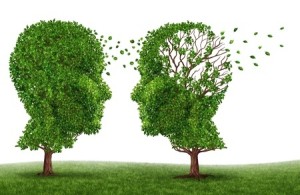The Alzheimer’s Basics
 Alzheimer’s is a devastating disease that is beginning to impact more and more of America’s elderly citizens every year. Understanding the warning signs and stages of this dementia is important to attain timely treatment for any loved one who may be struggling.
Alzheimer’s is a devastating disease that is beginning to impact more and more of America’s elderly citizens every year. Understanding the warning signs and stages of this dementia is important to attain timely treatment for any loved one who may be struggling.
What is Alzheimer’s?
Alzheimer’s is a specific form of dementia that causes significant memory, thinking, and behavior problems. It’s not a disease that occurs with the flip of a switch, but rather a slow and gradual condition that worsens over months and years. Eventually, the confusion caused by Alzheimer’s interferes with basic daily tasks. Though there is no cure for this disease currently, scientists and researchers have uncovered different treatments that can prevent and alleviate the symptoms of Alzheimer’s.
Why Does Alzheimer’s Occur?
To understand Alzheimer’s, you must understand the brain. The brain is unimaginably complex. At any given moment, more than 100 billion nerve cells, called neurons, are connecting with each other to communicate and complete jobs like learning, thinking, remembering, hearing, smelling, and more. It makes most sense to think of these brain cells as little factories.
Alzheimer’s disease begins to form when the cells’ factories can’t run well. Backups, breakdowns, and other issues prevent neurons from communicating with each other. Eventually, many of them die or cause damage to the brain. All of this damage culminates in symptoms of Alzheimer’s disease.
Symptoms of Alzheimer’s
During the early stages of Alzheimer’s disease, a person may have trouble remembering new names, struggle in social settings, misplace important objects, and exhibit difficulty thinking of the right words in conversation. As the disease progresses, middle-stage Alzheimer’s includes the inability to remember personal history and information, confusion about time and place, and the tendency to wander and get lost. By the time late-state Alzheimer’s rolls around, patients can no longer respond to their environments, carry on conversations, or recognize loved ones.
Potential Prevention and Treatment
If you have a family history of Alzheimer’s, there are certain measures you can take to stave off dementia. Exercise and healthy diet are smart choices no matter what, but mental stimulation and using Omega 3, 6 and 9 fatty acid supplements can keep the brain thriving. There are certain medications that aim to combat memory loss and other symptoms of Alzheimer’s as well. The research community is currently dedicated to uncovering a cure.

